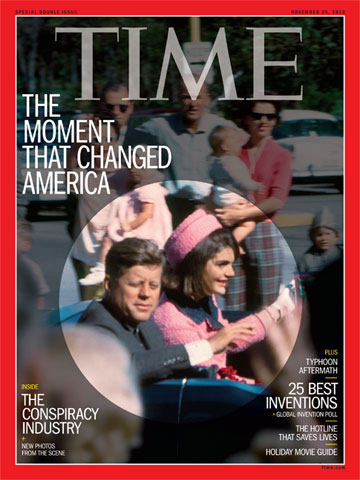
(8 of 8)
As the decade went on and the U.S. bogged down so painfully in Vietnam, emphasis shifted toward theories of a military coup. This is the favored framework of filmmaker Oliver Stone, whose 1991 smash hit JFK told a glamorized version of Garrison's failed prosecution in New Orleans. Stone believes that Kennedy was on the verge of making peace in the Cold War--he had opened back-channel communications with the Soviets and was planning a small initial withdrawal of troops from Vietnam. "All of these steps caused him to be regarded as a virtual traitor by elements of the military-intelligence community," Stone has written. "These were the forces that planned and carried out his assassination."
The theory that Kennedy's death was a Mob hit had a heyday that began in the 1970s, the age of the Godfather movies, the disappearance of Jimmy Hoffa and the Church Committee disclosures of links between the Mafia and the CIA. More recently, the publication of biographer Robert Caro's brilliant account of Lyndon Johnson's first hours and days as President has helped refresh interest in LBJ as the conspiracy mastermind. Although Caro's book, The Passage of Power, does not indict Johnson, it makes clear how quickly he moved into the vacuum left by Kennedy's death and how adroitly he stacked the Warren Commission and set its course.
WHAT MIGHT HAVE BEEN
I don't mean to belittle the passion of the Kennedy investigators when I say their search has become an industry, churning out books, videos, websites and conferences on topics as unlikely (Kennedy's body was surgically altered before the autopsy) as they are arcane ("Imaging Properties of the Bell & Howell 414PD Camera and Implications for Authenticity of the Zapruder Film"). Or when I note that while reading and listening to some of their productions, it is difficult to miss the notes of excitement and delight, as if perfecting their theories has become a sort of game.
I am also convinced that the search for meaning in the hideous brutality of Dealey Plaza long ago became as much about faith as forensics. Not religious faith, necessarily, but that set of beliefs that frames our approach to data and mystery. Each of us must have some sort of faith because we can never have perfect knowledge, no matter how much information we accumulate. Faith fills in the gaps, and those whose faith tells them that monstrous events imply monstrous causes will never accept that a weak little man, acting alone, murdered John Kennedy.
The endless quest to recover the shattered promise of that man reflects the unique relationship that many Americans have with their 35th President. Though Kennedy's achievements are relatively few compared with those of such men as Washington, Lincoln, the Roosevelts and Truman, in the hearts of his countrymen he frequently ranks as highly as they do or even above them. He alone is cherished less for what was than for what might have been. To close the book on his murder feels, in some way, like letting that open-ended promise slip away into the past. And that's something we do not wish to do.
TO SEE HOW THE ZAPRUDER FILM CAME TO LIFE, GO TO time.com/jfk50
